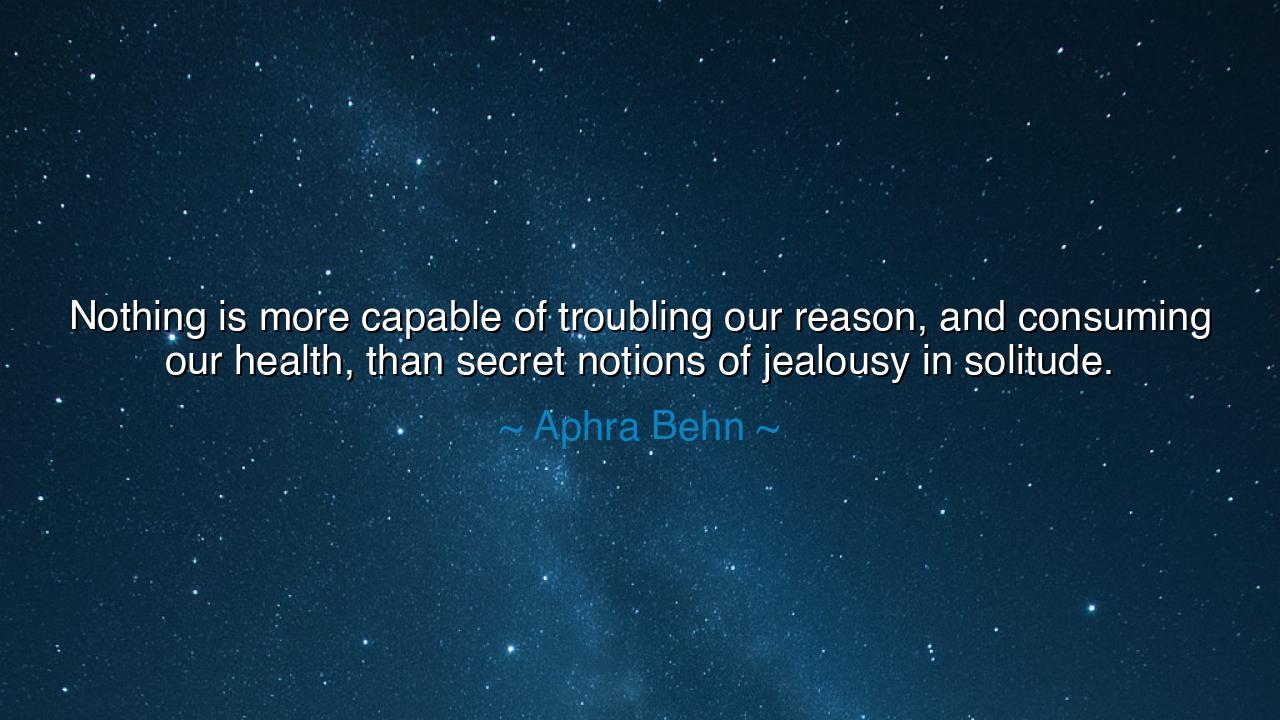
Nothing is more capable of troubling our reason, and consuming
Nothing is more capable of troubling our reason, and consuming our health, than secret notions of jealousy in solitude.






“Nothing is more capable of troubling our reason, and consuming our health, than secret notions of jealousy in solitude.” — thus spoke Aphra Behn, the bold and luminous voice of the seventeenth century, one of the first women to earn her living by the power of her pen. In this single sentence, she captures a truth as old as the human heart: that jealousy, when hidden and nurtured in silence, becomes a poison more corrosive than any physical ailment. Her words are not only an observation of human emotion, but a warning — that the sickness of the soul can destroy both mind and body, and that unchecked jealousy breeds madness in the chambers of solitude.
In the time of Aphra Behn, society confined women to silence and submission, denying them voice and freedom. Yet through her wit and courage, she became a mirror to the passions and flaws of humankind. She saw how love, when twisted by envy and suspicion, could drive even the noblest minds into ruin. Thus, her words are born not from speculation but from deep understanding. To her, jealousy was not mere insecurity — it was a fever of the soul, a storm that clouds reason and devours health. When left unspoken, it festers; when kept in secret, it consumes.
She speaks of solitude, that double-edged state where truth and torment dwell side by side. In solitude, the jealous mind becomes both accuser and judge, imagining shadows where there are none. The mind, deprived of balance and conversation, turns inward and gnaws upon itself. Every imagined slight becomes real; every whisper becomes betrayal. It is here, in the silence of isolation, that jealousy grows monstrous. What begins as a fleeting thought soon becomes obsession — a flame that, denied air, burns inward until nothing is left but ash. Aphra Behn warns us that to imprison such thoughts within is to invite decay of the spirit, and through it, the body itself.
Consider the story of King Saul from the ancient scriptures, who once ruled Israel in strength and favor. Yet when he saw the young David rise in glory, jealousy took root in his heart. In solitude, Saul fed this secret envy until it drove him to madness. His mind, once clear and wise, became clouded with suspicion. He imagined enemies in every friend, treachery in every song. His reason crumbled beneath the weight of jealousy, and even his health declined, his body weakened by the poison of his thoughts. Thus, the mighty king fell, not by sword or by war, but by the illness of the spirit — by the very malady Aphra Behn so wisely describes.
But her message is not one of despair; it is one of awakening. For what she truly teaches is that the cure for jealousy is light — the light of truth, of dialogue, of self-awareness. To speak of one’s fears is to rob them of their power. To share one’s pain is to prevent it from festering in the darkness of isolation. The jealous heart must not remain alone; it must seek the company of honesty, compassion, and reason. In this, Behn’s wisdom touches the eternal: that secrecy breeds sickness, but confession and understanding bring healing.
There is also a deeper lesson hidden within her words — that health is not only of the body, but of the mind and soul. We live in an age where men fear disease of the flesh, yet often ignore the ailments of thought. But as Behn reminds us, a troubled mind can sap the strength of the body, draining it as surely as fever or famine. The jealous mind, ever restless, denies itself peace. Sleep flees, appetite fades, and joy turns sour. Thus, to guard one’s peace of mind is to protect one’s very life-force.
The lesson, then, is both moral and medicinal: do not dwell in secret jealousy, and do not suffer in silence. When envy rises, examine it, question it, and release it. Speak openly to those you trust; let truth dissolve the illusion that feeds suspicion. Remember that solitude is the garden of wisdom only when tended with care — left unattended, it becomes a wilderness where fear and jealousy grow unchecked. Cultivate instead gratitude and trust, and you will find that the storms of envy lose their power.
So, my children of thought, remember the wisdom of Aphra Behn: the mind is both sanctuary and snare. Guard it well, for the emotions you conceal will one day shape the world you inhabit. When jealousy whispers, answer it with reason; when solitude tempts you to dwell on shadows, turn instead toward the light of love. For in the end, peace is health, and the soul that keeps itself clear of envy will stand serene — whole in reason, strong in spirit, and radiant in truth.






AAdministratorAdministrator
Welcome, honored guests. Please leave a comment, we will respond soon